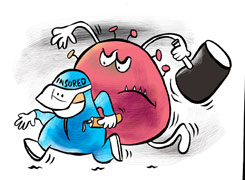Is Ten Therapy Sessions Enough for Vitiligo and Dark Spots?
Dr Karthiyayini Mahadevan | Answer |Ask -Follow
General Physician - Answered on Jun 12, 2024
She specialises in general medicine, child development and senior citizen care.
A graduate from Madurai Medical College, she has DNB training in paediatrics and a postgraduate degree in developmental neurology.
She has trained in Tai chi, eurythmy, Bothmer gymnastics, spacial dynamics and yoga.
She works with children with development difficulties at Sparrc Institute and is the head of wellness for senior citizens at Columbia Pacific Communities.... more

My mother has vitiligo spots on eyebrows and some little spots on body. It has been 3 years now . The spots on the body are just the same as they were earlier but now the spots on face are increasing. She has dark spots on face from many years. She is around 70 kgs and 5'5 . One doctor she met suggested her to apply ointment on the spots and gave her sunscreen and "costly" mild face wash. Now her face burns a lot when she is cooking or when she is under the sun. The doctor also wanted my mom to get peeling done for the dark spots but she refused. We took second opinion from other doctor and it was totally different . The other doctor said no peeling is required and the ointments won't do anything. HE said 10 therapy sessions are to be done . 2 per week. I am really confused by the opinions of the doctors. What should I do.
You may like to see similar questions and answers below
Dr Anshuman Manaswi | Answer |Ask -Follow
Plastic-Aesthetic Surgeon, Emergency Care Consultant - Answered on Nov 29, 2024
Dr Anshuman Manaswi | Answer |Ask -Follow
Plastic-Aesthetic Surgeon, Emergency Care Consultant - Answered on Dec 11, 2024
Dr Anshuman Manaswi | Answer |Ask -Follow
Plastic-Aesthetic Surgeon, Emergency Care Consultant - Answered on Jul 30, 2025
Ramalingam Kalirajan |10893 Answers |Ask -Follow
Mutual Funds, Financial Planning Expert - Answered on Dec 15, 2025
Ramalingam Kalirajan |10893 Answers |Ask -Follow
Mutual Funds, Financial Planning Expert - Answered on Dec 15, 2025
Radheshyam Zanwar |6746 Answers |Ask -Follow
MHT-CET, IIT-JEE, NEET-UG Expert - Answered on Dec 15, 2025
Ramalingam Kalirajan |10893 Answers |Ask -Follow
Mutual Funds, Financial Planning Expert - Answered on Dec 15, 2025
Ramalingam Kalirajan |10893 Answers |Ask -Follow
Mutual Funds, Financial Planning Expert - Answered on Dec 15, 2025
Ramalingam Kalirajan |10893 Answers |Ask -Follow
Mutual Funds, Financial Planning Expert - Answered on Dec 15, 2025
Samraat Jadhav |2508 Answers |Ask -Follow
Stock Market Expert - Answered on Dec 15, 2025
Ramalingam Kalirajan |10893 Answers |Ask -Follow
Mutual Funds, Financial Planning Expert - Answered on Dec 15, 2025
Reetika Sharma |425 Answers |Ask -Follow
Financial Planner, MF and Insurance Expert - Answered on Dec 15, 2025
Radheshyam Zanwar |6746 Answers |Ask -Follow
MHT-CET, IIT-JEE, NEET-UG Expert - Answered on Dec 15, 2025


























